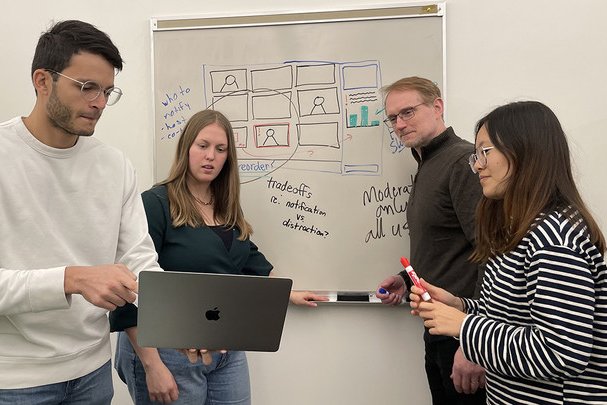CS&E Ph.D. Student Mo Houtti Earns Honorable Mention Award at ACM-CSCW

Department of Computer Science and Engineering Ph.D. student Mo Houtti earned the Honorable Mention Award at the 26th ACM Conference on Computer-Supported Cooperative Work and Social Computing (ACM-CSCW). The paper titled, “‘All of the White People Went First’: How Video Conferencing Consolidates Control and Exacerbates Workplace Bias”, explores workplace bias in video conferencing and interventions to mitigate bias. Houtti’s work also received an Impact Recognition for strong examples of work that demonstrate clear potential for real-world or practical impact.
“It's nice to have our work recognized,” said Houtti. “I’m excited about the work that we have done on this topic of inclusion and bias in video conferencing technology. This is something that the research community is looking at and that we can build on in the tech that we use every day.’”
Co-authored by fellow Ph.D. student Moyan Zhou, as well as Houtti’s advisors Professor Loren Terveen and Assistant Professor Stevie Chancellor, the project centered around one main question - how do these platforms shape or structure interaction between people in the workplace, and how does that interact with workplace bias? With the switch to remote work during the COVID-19 pandemic, many offices started meeting online through video conferencing platforms. After conducting interviews with working professionals about their experiences on video calls, Houtti’s team found that hosts have to control the discussion flow throughout meetings, putting them at the center of workplace bias.
“I think that most of us have had meetings where you want to talk and people are using the raise hand feature on Zoom,” said Chancellor. “Nobody has specified that raising your hand is the mechanism you use to participate instead of unmuting or fixed order. In person, we have social cues and norms to help. Someone raises their hand, or I lean forward slightly, or the team lead looks at someone and says, ‘It seems like you have an idea.’”
Following the interview analysis, Houtti’s team co-designed a prototype AI co-host with the study participants that aims to help create more inclusive meetings. Since hosts tend to be under-supported in meetings, the AI host can help relieve some of the stress of managing the meeting. Houtti hopes this human-centered approach will help fix these workplace biases that were unknowingly created during video conferences.
“This is a nice example of a human-centered AI approach,” said Terveen. “You might think of intelligent interventions to improve meetings by making them more equitable, but people don't like an automated agent taking over and telling them what to do. That's why assisting the host and participants, rather than dictating solutions, is a crucial element of our future work.”
This project is part of an ongoing partnership with Cisco Research. Learn more about the partnership.